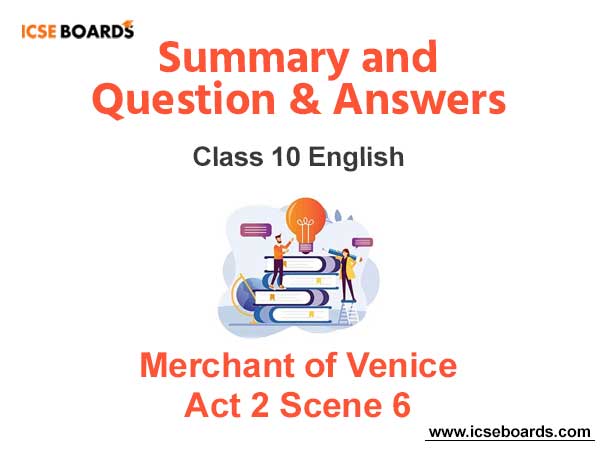Act 2 Scene 6 Summary Merchant of Venice
Students should read the Merchant of Venice Act 2 Scene 6 Summary ICSE Class 10 notes provided below designed as per the Merchant of Venice book used in ICSE Class 10 English Books. You should refer to all notes provided here for Merchant of Venice Workbook which are really important and can help you to get better marks in ICSE Exams
Merchant of Venice Act 2 Scene 6 Summary
REVIEW
The plot develops further. In this scene. Jessica and Lorenzo’s plan to elope is complete.
Jessica leaves her father’s house along with jewels and ducats.
The masquerade in which Jessica had to be a torch bearer is cancelled and as soon as Jessica and Lorenzo reach his friends, they start for Belmont.
In this scene, Shylock’s vindictiveness is doubled. He already hated Christians and now Christians have helped his only daughter forsake him and rob him. Secondly, audience’s or reader’s sympathy for Shylock is aroused because after all a daughter’s elopement is a family betrayal.
QUESTIONS AND ANSWERS
1. Read the extract given below and answer the questions that follow:
Gratiano:
And it is marvel he out dwells his hour for lovers ever run before the clock.
Salarino:
O’ten times faster Venus’ pigeons fly
To seal love’s bonds new-made, then they are wont
To keep obliged faith unforfeited
Gratiano:
That ever holds: who rises from a feast with the keen appetite that he sits down?
Where is the horse that doth untread again, his tedious measures with the unabated fire, that he did pace them
first? All things that are, are with more spirit chased than enjoyed.
Ques. Where does this scene take place? Who has out dwelt his hour?
Ans. This scene takes place near Shylock’s house.
Lorenzo’s friends are waiting for him and he is late.
Ques. Just before this extract Salerio refers to Venus and her pigeons, who is Venus?
How do the Venus’ pigeons behave as far as love is concerned?
Ans. Venus is the goddess of love.
Venus’ pigeons work faster when there is the beginning of a love affair. They are not so enthusiastic in the case
of old love.
Ques. How does Gratiano explain in the extract the state of people in love?
Ans. According to Gratiano, new lovers have spirit and zeal which lacks in old lovers. To prove his point, he gives
two examples.
One of a racing horse, when it begins running, it is full of spirit and when it returns the pace is slow. Similarly, when a man starts eating and when he famishes his food, there is clear difference between both the conditions.
Ques. Explain the meaning of ‘Where is the horse that doth untread again his tedious measures with the
unabated fire?”
Ans. There is no horse which finishes his journey with the same speed and spirit, with which he had begun.
Ques. Explain: ‘All things that are, Are with more spirit chased that enjoyed.’
Ans. According to Gratiano, there is more enthusiasm when we pursue something and when we achieve our pursuit we are not so zealous.
Ques. What does this statement show about the speaker’s attitude?
Ans. This statement shows that Gratiano has a cynical attitude towards life and people.
2. Read the extract given below and answer the questions that follow:
Lorenzo:
Sweet friends your patience for my long abode Not I, but my affairs have made you wait when you shall please to play the thieves for wives I will watch as long for you. Then, approach, here dwells my father Jew. Ho! Who’s within?
Ques. Where is Lorenzo? Who are his sweet friends?
Ans. Lorenzo is in front of Shylock’s house.
His sweet friends are Gratiano, Salerio and Salarino.
Ques. Give the meaning of the word ‘abode’.
Ans. The word ‘abode’ means place of living. Here ‘abode’ means delay.
Ques. What does the speaker promise in return of his friends’ long wait?
Ans. He promises to wait as long as they have waited for him.
Ques. What is meant by ‘to play the thieves for wives’. How apt are these remarks in the context?
Ans. The reality is that the elopement of Jessica with Lorenzo puts Lorenzo in the category of a thief. To get a wife, he has stolen her from her father’s house.
This remark is quite suitable considering the conditions that the father of Jessica is unaware of this situation.
Ques. Who appears on the stage after the extract? In what condition does the person appear?
Ans. Jessica appears just after this extract. She is attired as a page boy.
3. Read the extract given below and answer the questions that follow:
Jessica:
Here catch this casket, it is worth the pains,
I am glad ‘tis night, you do not look on me.
For I am much ashamed of my exchange;
But love is blind and lovers cannot see
The pretty follies that they themselves commit;
For if they could, Cupid himself would blush,
To see me thus transformed to a boy.
Lorenzo:
Descend, for you must be my torch bearer.
Ques. What do you think is sent down in the casket? How can you conclude that the contents in the casket are valuable?
Ans. There are jewels and money in the casket.
It is natural to conclude that the contents in the casket are valuable from what Jessica says, “catch this casket, it is worth the pain.”
Ques. What is meant by ‘I am much ashamed by my exchange’. Why is the exchange needed?
Ans. Jessica means to say that she is ashamed of wearing a page boy’s dress.
The exchange is needed as a disguise for Jessica so that no one may recognise her as she is leaving her father’s house and eloping with Lorenzo, of which her father would be totally against.
Ques. In what way love is blind in the context? Who is cupid?
Ans. Here the words ‘love is blind’ are said in a light tone. Jessica means that it is night, so Lorenzo will not properly see her in a page boy’s costume. Moreover, love is supposed to be blind that too will hinder him from looking at her.
Cupid in Greek mythology is the God of love.
Ques. In what way would Jessica hold a candle to her shame if she were a torch bearer?
Ans. It was night and a masque was arranged. Servants carrying a torch walked with the procession. Jessica was acting
as a torch bearer so it seemed that she was showing a torch to her shame as elopement was supposed to be a shameful act.
Ques. How is Jessica’s feminine nature highlighted in this extract?
Ans. Jessica did not like to be attired in a page boy’s costume. It was against her feminine nature. She is ashamed
of her
act of deceit and also of her disguise as a page boy. Here, she expresses her shame. In this way her feminine nature is highlighted.



